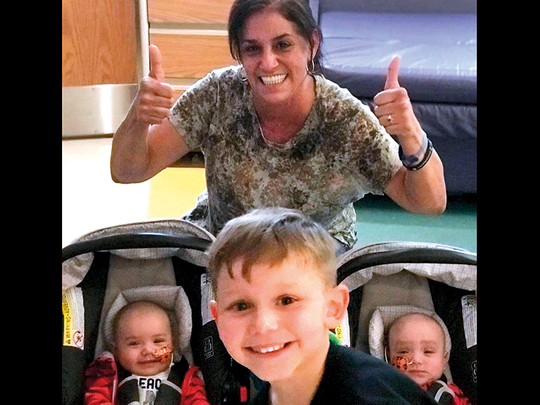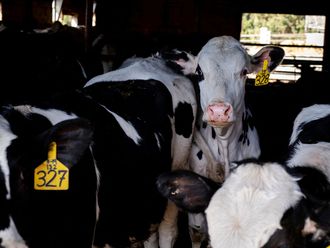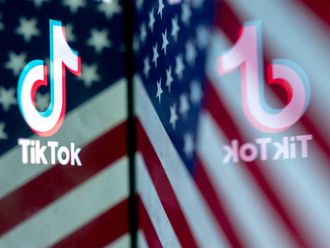
PHILADELPHIA It was barely sunrise and Michael DeMasi Jr. was romping through the corridors at a children’s hospital in Philadelphia, balancing on a red line that was etched into the floor design and telling his mother to tie a balloon to him so he could “fly.”
The 4-year-old boy fancied himself a real-life superhero, wearing a blue T-shirt with photographs of his 4-month-old twin brothers, who were born with a rare immunodeficiency disease.
Michael’s little brothers - Santino, “Sonny,” and Giovanni, “Gio” - needed a bone-marrow transplant, and when his parents told him that he was a donor match, Michael told them that he wanted to save his brothers and would give them some of his.
“Hey, Michael,” his mother, Robin Pownall, called out as she filmed her young son early one Thursday morning in March, running ahead of her through Children’s Hospital of Philadelphia (CHOP).
“Yeaaaah?” he responded, hanging back to let her catch up.
“You ready to go?” his mother asked.
“Yay!” he said, pumping his fists and jumping up and down.
“Where you going?” she asked him.
“To save my baby brothers,” he said.
“To save your baby brothers?” she repeated. “You’re the best.”
The preschooler knew what was about to happen, his mother said - a long needle would be pushed into the bone near his hip to extract the marrow, then the cells would be transplanted into his brothers.
He did it anyway.
And later in the day, when his brothers received the stem-cell infusion, Michael was there to watch, jumping and shouting, “That’s my bone marrow! That’s my bone marrow!” his mother said.
Nearly two months after the procedure, the twins were discharged last week from the hospital. Their mother posted a video on Facebook, showing Michael wearing a superhero T-shirt, smiling and standing between his little brothers.
“I saved you guys,” the preschooler said. “It’s time to go home.”
The twins
Santino and Giovanni were born in October, 2017, with Chronic Granulomatous Disease (CGD), an immune disease in which the immune system does not work properly, meaning even a common cold could become life-threatening, their mother said. She and the boys’ father, Michael DeMasi, were already familiar with the condition. Their oldest son, Dominick, 9, was also born with GCD and they knew it was a possibility that their other children would be born with the disease.
Following his diagnosis only weeks after his birth, Dominick was put on a transplant list and received stem cells from the umbilical cord of a donor. He is now considered cured, his mother said.
When the twins turned out to have CGD, 4-year-old Michael Jr., who was not born with the condition, was tested and found to be a match. His parents talked to their doctors about the risks, such as pain and soreness and complications from anaesthesia, then they sat down with Michael and tried to explain.
“We were straight up - ‘It’s going to be a big needle going into your back, bud,’” Pownall said she told him. “We asked him, ‘Do you want to do this? If you’re scared, you don’t have to.’ “
Pownall said her son asked whether his bone marrow would allow his little brothers to come home.
She said yes.
He said OK.
Pownall said her son told her he wanted to “help save my baby brothers.”
Still, Pownall said, “We were in no way, shape or form going to push anything.” She said that had Michael hesitated or showed reluctance, she and his father would have put the twins on the bone marrow registry. But doctors told them that bone marrow from a matching family member was the best choice. “It’s amazing - he’s so proud. Such a brave little guy.”
She added that doctors at the hospital sat down with Michael Jr.and made sure he understood and that he was okay with it.
March 8, 2018: Michael Jr was ready
The 4-year-old marched down to the hospital’s patient check-in area.
His mother had told him that he was going to be “a real-life superhero,” and the small boy who loves Captain America as well as Spider-Man, Batman and Superman seemed excited to join their ranks.
The nurse told him that she was going to give him some “giggle juice” and he would go to sleep, his mother recalled.
“I thought it was going to be harder on him than it was,” Pownall said. “He’s so small,” she added. “You don’t want your babies to be in pain.”
Michael Jr. woke up with small welts on his back, but insisted he was not in pain, his mother said.
Pownall posted a video after his procedure, showing Michael Jr.with blue Popsicle juice all over his face. “I’ve got a blue tongue,” he said, sticking it out for the camera. “Because my Popsicle was blue.”
Hours later, the 4-year-old was jumping up and down, watching his bone marrow go to work.
Pownall said that now the twins, who are nearly 7 months old, show no signs of Chronic Granulomatous Disease, though their doctors are monitoring them closely.
BOX
The ethics of it all
Art Caplan, a professor of bioethics and head of the division of medical ethics at the New York University School of Medicine, said situations in which children are the donors, such as Michael Jr, do present ethical questions, namely whether a child can truly understand the risks and grant their permission - a principle known as informed consent.
In addition, Caplan said, there may be risks to the donor - pain or other complications, and in instances in which the transplant is not successful, the donor may have to do it again or may begin to blame himself if the donation does not help or the recipient experiences a serious problem. He said that before such procedures are performed, he hopes to see an ethics committee review the circumstances to ensure there are no risks for the donor that the parents may not be considering.
But in general, “I’m inclined to allow it to happen,” he said, assuming that those involved understand and accept the risks.
It’s unclear whether CHOP had an ethics committee review Michael’s case. A hospital spokeswoman said she could not comment on Michael’s case, and when asked whether CHOP requires an ethics committee to weigh in on situations involving child donors, she said that she could not confirm that either.
The Washington Post












